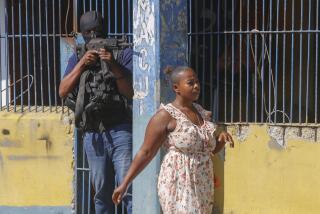Libyan rebels reject negotiations with Kadafi
- Share via
Reporting from Tripoli, Libya — Rebel leaders Sunday dismissed a purported offer by Moammar Kadafi to negotiate a transition in government, insisting that Libya’s longtime ruler turn himself in.
Musa Ibrahim, a spokesman for Kadafi’s toppled government, called the Associated Press’ New York headquarters to offer talks on a “transfer of power,” saying the leader’s son Saadi would conduct the negotiations. He said Kadafi remained in Libya but did not specify where.
But a top official of the Transitional National Council rejected the offer. “We have no negotiations with Kadafi and we can offer him only two things: safety and a fair trial,” said Ahmad Darrat, said to be incoming interior minister of the rebel government now taking the reins of power in Libya.
“There’s no negotiations,” Mahmoud Shammam, a spokesman for the transitional government in Tripoli, told reporters. “There were no negotiations before. There are criminals running from justice. We’re not talking to him. We’re going to arrest him.”
Kadafi was driven from his longtime base of power last week in a lightning offensive by lightly armed rebels storming the Libyan capital from several directions. Tripoli now suffers power, water and food shortages, and United Nations Secretary-General Ban Ki-moon has warned of an impending humanitarian crisis in the capital and the rebel-controlled Nafusa Mountains region.
Rebels entering the capital have found the bodies of dozens of apparently recent victims of violence at hospitals and military bases. Dozens of injured Libyans have crossed into Tunisia in recent days to seek treatment, according to Tunisian radio.
Rebels appear to have squelched the last pockets of armed Kadafi loyalists in the capital and are considering an offensive against the city of Surt, a remaining Kadafi stronghold, after negotiations to bring about the city’s surrender appear to have gone nowhere.
“As far as I know the negotiations still are going,” Shammam said. “Time is pressuring us. We’d like to unify Libya very soon.
“We’re not going to wait endlessly.”
The transitional government, still based in eastern Libya but moving to Tripoli, is struggling to take control of the country after the capture of the capital by rebel fighters from the country’s west.
Shammam said the transitional council’s two top leaders, Mustafa Abdul Jalil and Mahmoud Jibril, were meeting in Qatar to discuss their possible arrival in the capital.
Faisal Gergab, a transitional government official, told reporters that a “stabilization team” has been traveling around the capital to assess humanitarian needs; officials said 70% of Tripoli residents lacked water.
Gergab said a million-gallon tanker of water had just berthed in Tripoli’s port and that the transitional government would soon begin distribution at mosques. Another tanker carrying gasoline had arrived at the port in Zawiya, west of Tripoli. More shipments of gas and cooking fuel should be arriving soon, he said.
“We hope the fuel situation will be stabilized in the next few days,” he said.
Officials also announced plans for banks to begin reopening within 30 days and to allow residents to withdraw money and government employees to collect salaries. Plans are also being prepared to reopen police stations in part to prevent the type of lawlessness and budding anger that afflicted Iraq after the 2003 U.S.-led invasion.
Shammam said the transitional government might request technical police assistance from other Arab or Islamic countries.
“We’re not going to repeat the mistakes we saw in Baghdad or Kabul,” Shammam said.
The transitional government has managed to complete one thing. Its satellite television station Ahrar, based in Qatar, has taken over the satellite slots from Libyan state television.
Special correspondent Ryma Marrouch contributed to this report.
More to Read
Sign up for Essential California
The most important California stories and recommendations in your inbox every morning.
You may occasionally receive promotional content from the Los Angeles Times.










